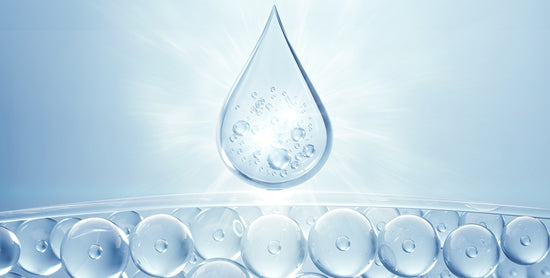Do you have dry or dehydrated skin? Did you know they’re not the same thing? Understanding what it means to have dry vs. dehydrated skin is the key to boosting your skin’s health, helping it look brighter and feel softer.
If you have a skin condition like psoriasis or eczema, you may have both dry and dehydrated skin. But, don’t worry, there are things you can do to enhance your skin’s hydration to help your eczema or psoriasis-prone skin look and feel better than ever.
What is Dry Skin?

Dry skin is a skin type that you’re born with. And, it’s caused by a lack of oil due to reduced sebum production. This condition results in fewer lipids to retain moisture within your skin’s layers, lowering your skin’s defences against external threats like dry weather. And, when you scratch dry skin, you will usually see flaking. Dry skin is commonly found in people with psoriasis, eczema and other forms of dermatitis.
What is Dehydrated Skin?
Dehydrated skin, on the other hand, describes the condition of your skin that can be changed by certain lifestyle choices. And, it refers to a lack of water in the skin, rather than a lack of oil. So, dehydrated skin can be caused by external factors such as weather, diet and caffeine consumption. Dehydrated skin feels tight, appears dull, may show more fine lines, has more pronounced under-eye circles and is more prone to congestion, irritation and inflammation.
Dehydration and Breakouts
Even though a buildup of oil causes breakouts, did you know thirsty skin can make breakouts worse? Dehydrated skin can cause breakouts because the imbalance in your skin’s water content causes your skin to overproduce sebum, the natural oil that lubricates the skin. So, this overproduction of sebum can lead to clogged pores, which can then trap bacteria and dead skin cells, leading to acne breakouts. And, if you have atopic dermatitis or another skin condition like psoriasis, breakouts are the last thing you want to deal with.
How do you know if your skin is dry vs. dehydrated?

Feel your skin. The look and feel of your skin can indicate whether you have dry or dehydrated skin, or even both.
What are the signs of dry skin?
-
It feels rough
-
Often scales or flakes off in large pieces
-
It may be itchy
-
You may notice less tightness
What are the signs of dehydrated skin:
-
It looks dull or has an uneven complexion
-
Fine lines in places you don’t usually have them
-
Congestion and breakouts in areas you don’t usually have them
-
Darker under-eye circles
Dry and dehydrated skin
Many people with skin conditions like eczema and psoriasis are genetically programmed to have dry skin, which can also become dehydrated. So, this double whammy of thirsty skin can leave it rough, itchy and dull.
The good news is, it’s easy to hydrate your skin. And, there are handy ways to manage your dry skin type once you know what to do. Firstly though, it’s important to understand why you have to keep your skin hydrated, especially if you have a skin condition.
How does dehydrated or dry skin worsen your skin condition?

Dry and dehydrated skin worsens irritation
When your skin is dry, it’s more prone to irritation. When you compound dehydration on top of dry skin, you’re more likely to experience a flare-up or exacerbation of your symptoms.
Dehydrated skin compromises your already delicate skin barrier
Dehydrated skin can compromise your skin’s protective barrier, which can lead to increased sensitivity and inflammation. This can further aggravate conditions like psoriasis, eczema or other forms of dermatitis, leading to more severe symptoms and longer-lasting flare-ups.
Dehydrated skin can cause skin damage and even infection
When your skin is dehydrated, it’s more susceptible to damage and inflammation. So, the lack of water makes the skin less elastic and more prone to fine lines and wrinkles. Dehydrated skin also increases the likelihood of skin cracking, increasing your risk of infection. So, this can worsen skin conditions like eczema and psoriasis.
But don’t let that get you down. There are a few important things you can do to increase the hydration of your skin. And, while you can’t change dry skin, you can use specific skincare to help you manage it better.
How to Manage Dry Skin and/or Dehydrated Skin
If you were born with dry skin, that’s your skin type, and that’s OK! Even if you weren't, here are five lifestyle tips to help you keep your skin as hydrated as possible.
1. Look for skincare products designed for dry skin
While you can’t change your skin type, you can protect the delicate barrier that locks in your skin’s oil. And the best way? Use products specifically designed for dry skin.
Certain medical-grade skincare lines are available that can minimize symptoms associated with dry skin. So, if you have eczema or psoriasis, look for non-steroid based creams designed for your specific skin condition.
2. Use skincare ingredients proven to boost the hydration level of your skin
Not all skincare ingredients are created equal. Look for ingredients proven to lock hydration into your skin. This is especially important if you have eczema or psoriasis. One example is the novel HYDROSURF™ glycolipid technology, found exclusively in ARCTIVA Eczema Cream and ARCTIVA Psoriasis Cream. HYDROSURF delivers water and beneficial ingredients deep into your skin. HYDROSURF™ directly combats dehydration by:
- Increasing your skin’s water mobility to reduce inflammatory processes associated with skin conditions
- Significantly enhancing moisture retention to boost your skin’s hydration
- Improves bio-availability of skincare ingredients
- Enhances barrier function and moisture retention for better hydration
- Stimulates skin activity and exfoliation for better vitality
- Increases water mobility to improve skin cells
3. Avoid very hot showers
Hot water strips your skin of its natural oils, worsening the symptoms of dry skin immediately. If you have dry skin, and particularly if you have atopic dermatitis, eczema or psoriasis, shower in warm water. This applies to face washing too.

4. Always apply specially formulated dry skin moisturizer after showering, hand-washing and swimming
Water can be surprisingly drying. This drying effect is worsened by soaps, chlorine and hard water. Instead of avoiding fun activities like swimming in the pool with your family, always follow a swim or with a shower and moisturizer. Choose a product formulated specifically for dry skin to help enhance your skin’s hydration barrier, and maintain your skin’s delicate oil balance.
5. If you have dry skin, avoid letting it get dehydrated
When you have dry skin, you must make sure it doesn’t become dehydrated as well. The best way to avoid dehydrated skin is by drinking lots of water and avoiding eating and drinking things that deplete your body’s water stores (such as caffeine and salty foods)
By understanding the difference between dry and dehydrated skin, and taking steps to boost your skin's hydration, you can help keep your eczema and psoriasis flare-ups at bay. Look for moisturizers that lock in your skin’s natural water and oils, and stay hydrated every day. By adding the five lifestyle tips above to your daily routine, you can keep your skin feeling soft and looking fresh.






